5-Day Limiting Belief Challenge Day 4: Name the Cost of Staying Stuck
5-Day Limiting Belief Challenge Day 3: Expose the Hidden Payoff
5-Day Limiting Belief Challenge Day 2: Trace It to the Source
5-Day Limiting Belief Challenge Day 1: Spot the Real Block
5-Day Limiting Belief Challenge Day 0: Introduce yourself
I am so excited that you are joining us for this year's 5-Day Limiting Belief Challenge.
In a comment down below, please introduce yourself. Let us know where you are joining us from and what you are hoping to learn/achieve during the week.
Introduce yourself here.
Tapping for feeling defined by my past
Today we are going to tap for selflessness.
Thanks for taking part in the 30-Day Tapping Challenge!
Don’t forget to sign-up to receive daily reminders so that you don’t miss a day of tapping.
If you liked today’s video, please share it with a friend.
Tapping for finding clarity about what I want
Today we are going to tap for selflessness.
Thanks for taking part in the 30-Day Tapping Challenge!
Don’t forget to sign-up to receive daily reminders so that you don’t miss a day of tapping.
If you liked today’s video, please share it with a friend.
Tapping to be worthy of love
Today we are going to tap for selflessness.
Thanks for taking part in the 30-Day Tapping Challenge!
Don’t forget to sign-up to receive daily reminders so that you don’t miss a day of tapping.
If you liked today’s video, please share it with a friend.
Tapping to share my enthusiasm with others
Today we are going to tap for selflessness.
Thanks for taking part in the 30-Day Tapping Challenge!
Don’t forget to sign-up to receive daily reminders so that you don’t miss a day of tapping.
If you liked today’s video, please share it with a friend.
The Time to Share is Now – Jondi Whitis
Jondi loves energy work, from her beloved EFT to a host of Tapping adaptations that reflect years of practical hands-on training, mentoring and client work. She calls herself ‘The People's Teacher' in honor of her commitment to making energy work accessible to all.
Jondi's body of work includes training for groups and individuals
seeking to use energy tools for healing, recovery from trauma, and personal transformation. She has a particular place in her professional life for humanitarian outreach and work with veterans, indigenous peoples, and teachers.
She is a longtime member of EFT International™, and a member of its Training and Accreditation Board, as well as ACEP's Humanitarian Committee, an original member of the EFT Guild, and the founder of the annual Spring Energy Event gathering.
Website: JondiWhitis.com
Understanding The “Energy” in Energy Psychology
In an effort to make the research around tapping more accessible to the general public David Feinstein, Ph. D., is writing summaries of these studies. You can find all the summaries that have been shared so far here.
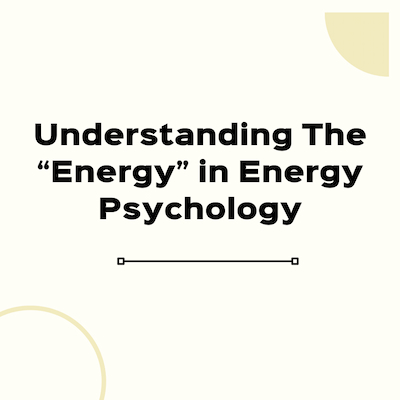 In more than 120 clinical trials, energy psychology, which is the umbrella term for the Emotional Freedom Techniques, Thought Field Therapy, “tapping, “and related approaches, has been shown to deliver significant improvements across a wide range of psychological and physiological conditions with striking speed and durability.
In more than 120 clinical trials, energy psychology, which is the umbrella term for the Emotional Freedom Techniques, Thought Field Therapy, “tapping, “and related approaches, has been shown to deliver significant improvements across a wide range of psychological and physiological conditions with striking speed and durability.
But despite impressive results in clients with issues ranging from PTSD and depression to cardiovascular and immune disorders, many therapists and clinicians dismiss the approach because of the vague and often controversial use of the term energy in energy psychology. Read more>>>
About David: DAVID FEINSTEIN, Ph.D., is a clinical psychologist and a pioneer in developing innovative therapeutic approaches, leading to nine national awards for his books on consciousness and healing. He and his wife, Donna Eden, have built the world’s largest and most vibrant organization teaching energy medicine. Their latest award-winning book, The Energies of Love, achieved best-seller status on the NY Times Relationship List. David has served on the faculties of The Johns Hopkins University School of Medicine, Antioch College, and the California School of Professional Psychology.
How Tapping Can Bring Peace and Healing to Survivors of Earthquakes, Shootings, Pandemics, and Other Disasters
In an effort to make the research around tapping more accessible to the general public David Feinstein, Ph. D., is writing summaries of these studies. You can find all the summaries that have been shared so far here.
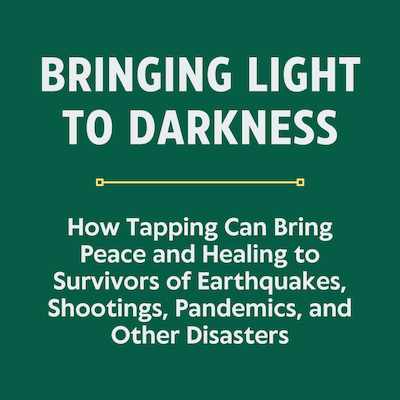 The number of natural disasters, from hurricanes and tornadoes to floods and forest fires, has nearly doubled in the past decade compared to the previous decade due largely, according to the United Nations, to “extreme weather events.” Meanwhile, human-made disasters–such as mass shootings, warfare, violent conflicts impacting civilian populations, and industrial accidents–have also increased exponentially.
The number of natural disasters, from hurricanes and tornadoes to floods and forest fires, has nearly doubled in the past decade compared to the previous decade due largely, according to the United Nations, to “extreme weather events.” Meanwhile, human-made disasters–such as mass shootings, warfare, violent conflicts impacting civilian populations, and industrial accidents–have also increased exponentially.
Whether natural or otherwise, disasters can severely impact mental health. Between 30 and 60 percent of individuals who survive a disaster suffer with the symptoms of PTSD, and all must deal with enormous emotional and practical challenges. Even for those who do not develop PTSD, symptoms of anxiety, depression, paranoia, sleep disturbance, substance abuse, and stress-related physical illness are not unusual. Based on hundreds of reports from the field and a growing number of formal studies, energy psychology or acupoint tapping has been remarkably effective in the treatment of trauma-based psychological difficulties. Read more >>>
About David: DAVID FEINSTEIN, Ph.D., is a clinical psychologist and a pioneer in developing innovative therapeutic approaches, leading to nine national awards for his books on consciousness and healing. He and his wife, Donna Eden, have built the world’s largest and most vibrant organization teaching energy medicine. Their latest award-winning book, The Energies of Love, achieved best-seller status on the NY Times Relationship List. David has served on the faculties of The Johns Hopkins University School of Medicine, Antioch College, and the California School of Professional Psychology.
Why Tapping Works – Six Evidence-Based Premises That Demonstrate the Power of Tapping
In an effort to make the research around tapping more accessible to the general public David Feinstein, Ph. D., is writing summaries of these studies. You can find all the summaries that have been shared so far here.
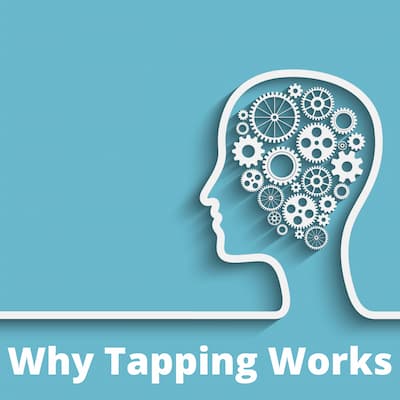 When acupoint tapping protocols were, in the 1980s, first formulated with a focus on psychological change, they were met with skepticism – even mockery – by the clinical community. But a lot has changed since then. Today, hundreds of clinical trials, peer-reviewed papers, and anecdotal reports show the positive – often rapid – transformational effects of energy psychology and tapping. Hidden within this growing literature are 6 fundamental evidence-based premises that demonstrate why tapping works and how it can be used as a remarkably powerful and effective technique in treating a myriad of challenging psychological and physiological issues. Read more >>>
When acupoint tapping protocols were, in the 1980s, first formulated with a focus on psychological change, they were met with skepticism – even mockery – by the clinical community. But a lot has changed since then. Today, hundreds of clinical trials, peer-reviewed papers, and anecdotal reports show the positive – often rapid – transformational effects of energy psychology and tapping. Hidden within this growing literature are 6 fundamental evidence-based premises that demonstrate why tapping works and how it can be used as a remarkably powerful and effective technique in treating a myriad of challenging psychological and physiological issues. Read more >>>
About David: DAVID FEINSTEIN, Ph.D., is a clinical psychologist and a pioneer in developing innovative therapeutic approaches, leading to nine national awards for his books on consciousness and healing. He and his wife, Donna Eden, have built the world’s largest and most vibrant organization teaching energy medicine. Their latest award-winning book, The Energies of Love, achieved best-seller status on the NY Times Relationship List. David has served on the faculties of The Johns Hopkins University School of Medicine, Antioch College, and the California School of Professional Psychology.
How Acupoint Tapping Can Help Transform Relationships
In an effort to make the research around tapping more accessible to the general public David Feinstein, Ph. D., is writing summaries of these studies. You can find all the summaries that have been shared so far here.
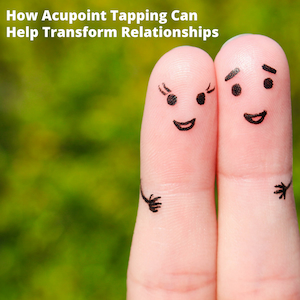 Relationships are challenging for everyone, yet the quality of your relationships correlates strongly with your happiness, sense of well-being, and even your physical health. Can acupoint tapping help you and your clients address the challenging issues that even the best relationships bring our way? Practitioners are, in fact, finding that the answer to that question is “Yes!” Tapping can be effectively applied to foster greater intimacy, trust, understanding, and ease.
Relationships are challenging for everyone, yet the quality of your relationships correlates strongly with your happiness, sense of well-being, and even your physical health. Can acupoint tapping help you and your clients address the challenging issues that even the best relationships bring our way? Practitioners are, in fact, finding that the answer to that question is “Yes!” Tapping can be effectively applied to foster greater intimacy, trust, understanding, and ease.
This month’s article takes a close look at the power of energy psychology for improving relationships. It shows how tapping can be used to develop 7 key relationship skills and includes revealing examples from Donna Eden’s 44-year relationship with her husband and closest collaborator, David Feinstein (hint: it’s not always been easy, even after it’s become wonderful!) Read more >>>
About David: DAVID FEINSTEIN, Ph.D., is a clinical psychologist and a pioneer in developing innovative therapeutic approaches, leading to nine national awards for his books on consciousness and healing. He and his wife, Donna Eden, have built the world’s largest and most vibrant organization teaching energy medicine. Their latest award-winning book, The Energies of Love, achieved best-seller status on the NY Times Relationship List. David has served on the faculties of The Johns Hopkins University School of Medicine, Antioch College, and the California School of Professional Psychology.
Perfectionism Is Protection (That Is Running Amok)
Note: This article first appeared March 26th, 2014 and has been updated.
When the same topic shows up repeatedly in client sessions over a short period of time, it always gets my attention.
A significant number of my clients have recently been reporting that they are struggling with a tendency towards perfectionism. They tell me that it's getting in the way of their completing tasks and making progress.
Perfectionism generally shows up in two ways.
The first and most common way is spending way too much time on a task to make sure it is just perfect before moving on. This is especially prevalent when you are working on something that other people will see, such as creating a product or service for your business.
This kind of perfectionism becomes problematic because it causes us to fall behind schedule, or never get to the other tasks we need to address.
The second way that perfectionism presents itself is when we never make a start on certain tasks because of the subconscious fear that they won't turn out perfectly.
When humans lived in nomadic tribes many thousands of years ago, the world was a treacherous place. Danger lurked around every corner and we were hardwired for caution and safety. Humans didn't start anything they couldn't finish for fear of depleting precious reserves of energy that might be needed in a life threatening situation.
It's an understatement to point out that neither of these outcomes are useful!
Perfection Is Protection
At its core, perfectionism is really about keeping us safe. It is much less about something needing to be perfect because perfect is better, and more about fearing what may go wrong if it is not perfect.
Subconsciously you might worry that if something is not perfect:
It will end badly
You will be judged as not good enough
Others won’t trust you in the future
You will be found out to be a fraud
Those concerns might seem extreme, especially when perfectionism is focused on small daily tasks, but in reality that is what is happening.
What Could Go Wrong?
Below are some simple steps to help you interrupt your drive towards perfection.
I encourage you to tap the entire time you are doing this process. When I do exercises like this one, I often tap on my collar bone with my left hand and write out my answers with my right.
- First, imagine taking and completing the action you are struggling with.
- Next, tune in to whatever physical sensation arises when you are thinking about the action you are resisting. Ask that sensation “What would go wrong if I don’t do this perfectly?”
- Ask the sensation “What proof do I have that this is true?” This is one of my favorite questions because it reveals whatever is propping up the belief that something could go wrong. Does it produce a memory from the past? Tap on it! Does it unveil a limiting belief that we know isn’t true? Tap on it!
- Continue to tap on whatever comes up in response to these two questions!
By undermining the “proof,” we can also undermine the belief that something could go wrong. And when the fear of something going wrong is dislodged, then perfectionism doesn’t arise because it no longer needs to keep us safe. This leads us to taking more action, more progress, and feeling more comfortable with sharing our work with others.
Energy Psychology Is Proving to be a Powerful Antidote to PTSD
In an effort to make the research around tapping more accessible to the general public David Feinstein, Ph. D., is writing summaries of these studies. You can find all the summaries that have been shared so far here.
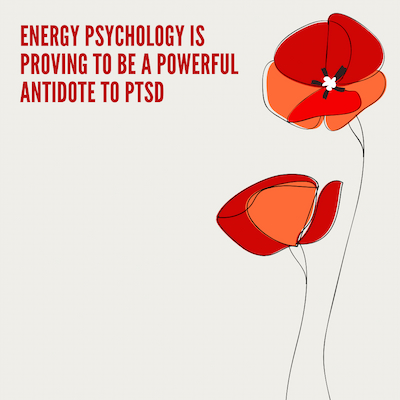 Every year, more than 8 million people in the United States struggle with Post Traumatic Stress Disorder (PTSD) along with another 350 million people worldwide. PTSD can occur in people who have experienced or even witnessed a severe trauma, and it affects areas of the brain connected to managing difficult emotions, especially fear and anxiety. PTSD can create intense physical, emotional, and mental distress, and if left untreated, it can lead to long-term psychological and physiological damage. Thankfully, energy psychology – in this article acupoint tapping – can help! read more…
Every year, more than 8 million people in the United States struggle with Post Traumatic Stress Disorder (PTSD) along with another 350 million people worldwide. PTSD can occur in people who have experienced or even witnessed a severe trauma, and it affects areas of the brain connected to managing difficult emotions, especially fear and anxiety. PTSD can create intense physical, emotional, and mental distress, and if left untreated, it can lead to long-term psychological and physiological damage. Thankfully, energy psychology – in this article acupoint tapping – can help! read more…
About David: DAVID FEINSTEIN, Ph.D., is a clinical psychologist and a pioneer in developing innovative therapeutic approaches, leading to nine national awards for his books on consciousness and healing. He and his wife, Donna Eden, have built the world’s largest and most vibrant organization teaching energy medicine. Their latest award-winning book, The Energies of Love, achieved best-seller status on the NY Times Relationship List. David has served on the faculties of The Johns Hopkins University School of Medicine, Antioch College, and the California School of Professional Psychology.
The Trouble With The Word Quit
I just typed “quotes with quit” into Google and here are some of the results:
I hated every minute of training, but I said, ‘Don’t quit. Suffer now and live the rest of your life as a champion.’ — Muhammad Ali
If you live long enough, you’ll make mistakes. But if you learn from them, you’ll be a better person. It’s how you handle adversity, not how it affects you. The main thing is never quit, never quit, never quit. — William J. Clinton
Effort only fully releases its reward after a person refuses to quit. — Napoleon Hill
Winners never quit and quitters never win. — Vince Lombardi
We will all fail in life, but nobody has to be a failure. Failing at a thing doesn’t make you a failure. You are only a failure when you quit trying. — Joyce Meyer
If you quit ONCE it becomes a habit. Never quit! — Michael Jordan
For the most part, I agree with these quotes.
Most of the success in my life has come after I pushed past the place of struggle and pain. A sound work ethic and persistence are both important.
But there is a big problem with all the “Quitters never win” talk. It builds the unconscious belief that we shouldn’t quit anything. On a subconscious (and sometimes a conscious) level we equate quitting with failure. AND sometimes we make it even more dramatic than that. Instead of saying we have quit (an action), we call ourselves a quitter (as in defining ourselves as such).
There Are Things We Need To Quit!
Sometimes quitting something is the smartest thing we can do.
Some of them are obvious. People want to quit smoking, eating too many sweets, or staying in bed past midday on the weekend.
If a friend told you they wanted to quit smoking, I'm sure you wouldn’t respond, “Quitters never win.” That would just be silly!
But there is a part of us that thinks we have to finish everything we start and that quitting is a sign of weakness, or it questions our integrity because we are not living up to our work.
In truth, there are lots of things in your life that you need to quit doing.
Some of them were never healthy to begin with (like smoking), whereas others started out as helpful, but are no longer.
For example, you might have enrolled in a class because you thought it would help your career, but your goals have changed since you started the class. By staying in the class you are wasting your time and money.
BUT…a part of you won't let you give up the class because of the belief that quitting is a sign of weakness. Quitting signals your lack of integrity. And quitters never win!
I Give You Permission To Quit!
I want you to be a quitter. I want you to give up. I want you to let go of the commitments.
Not all of them. Not even most of them. Just the ones that are no longer serving you.
As you are thinking about this, is there a knot in your stomach? Is there a part of you that feels like you are letting yourself down, your family down, your pattern down, your collaborators down, or your religion down?
If so, tap along to this:
There is a part of me that doesn’t want me to quit…Because quitters never win…And winners never quit…But this is no longer serving me…It is a waste of my time and effort…It is holding me back…I am not quitting it because it is hard…I am not quitting it because it is too much…I am quitting it because I need to be doing something else…Quitting this is not a sign of weakness…It is a sign of strength to let go of something that is no longer serving me…It is OK for me to quit this thing that is no longer good for me…It is better for me to quit…I am not failing…I am crafting the life I want and need to create…I am not choosing away from something…But instead choosing toward something that is serving me.
Have you met energy psychology’s mother?
In an effort to make the research around tapping more accessible to the general public David Feinstein, Ph. D., is writing summaries of these studies. You can find all the summaries that have been shared so far here.
Did you know that Energy Psychology is a derivative of Energy Medicine? Energy Medicine works with at least nine major energy systems. In contrast, Energy Psychology modalities generally focus on only one of these systems. These may be the chakras, the aura, or most frequently, the meridians (by tapping on or otherwise stimulating the acupuncture points that are distributed along the meridian lines).
Energy Psychology draws from a narrow range of Energy Medicine techniques and applies them to psychological and spiritual issues. Research shows that it is very good at this, with clinical outcomes that are notable for their power, speed, and durability.
A way to think about the relationship between Energy Medicine and Energy Psychology is to look at the relationship between conventional medicine and conventional psychiatry. Psychiatry draws from conventional medicine, using only a small range of the tools available for treating health issues, and it focuses what it does use on mental health issues. In this sense, psychiatry is a derivative of conventional medicine. In a parallel way, Energy Psychology is a derivative of Energy Medicine.
So Energy Medicine, whose roots extend back thousands of years, is the “mother” of Energy Psychology. The glaring difference with psychiatry is, of course, that psychiatrists have gone through four years of medical school, including hands-on clinical “rotations” in eight of the major medical specialties before entering their three-year intensive residency in psychiatry. Many Energy Psychology practitioners, on the other hand, may have never taken a single course in energy medicine.
This article offers Energy Psychology practitioners and others who might be less schooled in Energy Medicine a glimpse into the development of one of the most widely-known and highly-respected contemporary forms of Energy Medicine, Eden Energy Medicine, based on the work of Donna Eden, an ACEP Lifetime Achievement Award recipient. It then delves into the controversial question of whether subtle energies that science hasn’t been able to measure or even detect—Iike the “life force,” “chi,” or “prana”—can be accessed for health and healing, and whether they even, in fact, exist. Read more…
About David: DAVID FEINSTEIN, Ph.D., is a clinical psychologist and a pioneer in developing innovative therapeutic approaches, leading to nine national awards for his books on consciousness and healing. He and his wife, Donna Eden, have built the world’s largest and most vibrant organization teaching energy medicine. Their latest award-winning book, The Energies of Love, achieved best-seller status on the NY Times Relationship List. David has served on the faculties of The Johns Hopkins University School of Medicine, Antioch College, and the California School of Professional Psychology.
How Tapping Can Help to Heal the Psychological Roots of Illness: Saving Pauline
In an effort to make the research around tapping more accessible to the general public David Feinstein, Ph. D., is writing summaries of these studies. You can find all the summaries that have been shared so far here.
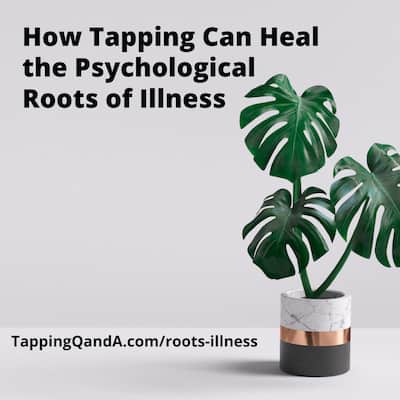 Over 2,000 years ago, Aristotle said, “Body and soul respond to one another in sympathy.” His poetic observation probably arose from the fact that physicians of ancient Greece believed the life of the spirit is somehow intertwined with the state of the body and that emotional balance is a crucial influencer in health.
Over 2,000 years ago, Aristotle said, “Body and soul respond to one another in sympathy.” His poetic observation probably arose from the fact that physicians of ancient Greece believed the life of the spirit is somehow intertwined with the state of the body and that emotional balance is a crucial influencer in health.
Although Western medicine has long grappled with connecting the mind and emotions in treating illness, significant, positive breakthroughs have been made in recent years. This is particularly true when it comes to a mind-body intervention that appears to have special strengths in its ability to address psychological factors in illness.
Energy psychology is proving to be a highly effective approach to overcoming difficult emotions and unhelpful beliefs without a long course of psychotherapy. Read more…
About David: DAVID FEINSTEIN, Ph.D., is a clinical psychologist and a pioneer in developing innovative therapeutic approaches, leading to nine national awards for his books on consciousness and healing. He and his wife, Donna Eden, have built the world’s largest and most vibrant organization teaching energy medicine. Their latest award-winning book, The Energies of Love, achieved best-seller status on the NY Times Relationship List. David has served on the faculties of The Johns Hopkins University School of Medicine, Antioch College, and the California School of Professional Psychology.

